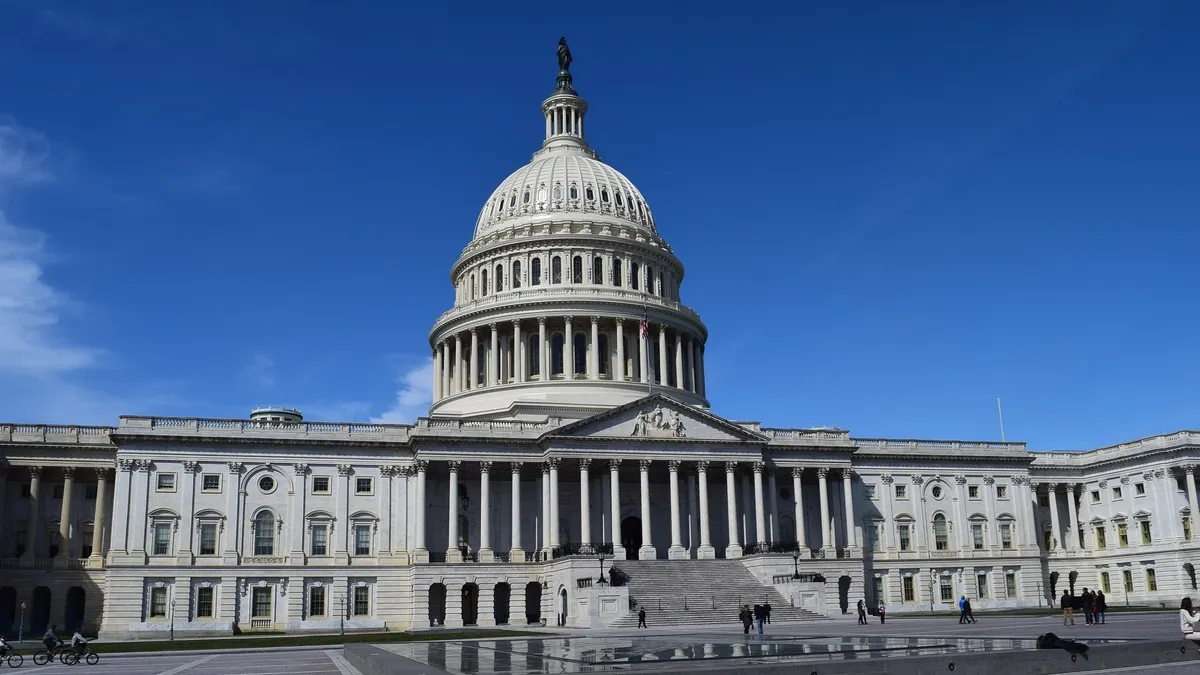Dive Brief:
- The $2 trillion Coronavirus Aid, Relief, and Economic Security (CARES) Act, a federal stimulus package to help the economy cope with the new coronavirus (COVID-19), includes $25 billion in federal funding for public transportation systems to fund day-to-day operations, make up for lost revenue and sustain jobs. President Trump signed the bill Friday.
- The legislation, which received overwhelming bipartisan support in both chambers, comes with transit agencies facing difficult financial waters ahead. In a recent report, TransitCenter estimated agencies will lose up to $38 billion annually due to lost fare revenue, the need to sustain jobs and additional costs related to the coronavirus like accelerated cleaning and protective equipment for employees.
- The bill's supporters said it will help sustain more than 430,000 transit jobs nationwide and will help to ensure people can continue to travel to their jobs, healthcare and other essential services. "Thanks to this deal, essential transit service has a better chance to survive until this unprecedented public health crisis subsides and we will need to depend on transit service to move millions of people and get the economy moving once again," Transportation for America Director Beth Osborne said in a statement.
Dive Insight:
Transit agencies across the country have seen ridership plummet as people are instructed to stay at home and practice social distancing, with many agencies urging riders to only take essential trips. This has allowed systems more time to clean their vehicles and stations to prevent the spread of the infection.
The $25 billion infusion will be crucial in maintaining decent levels of service for those who still ride for essential purposes. In a statement, Larry Willis, president of the Transportation Trades Department, AFL-CIO (TTD), said the CARES Act will "play a central role in stabilizing critical industries and ensuring working families can weather this crisis." Willis called for further federal action to mitigate the long-term effects of the coronavirus.
But it was a battle to get any funding for public transit, especially in earlier iterations of the bill. Transportation for America and the Union of Concerned Scientists launched a major advocacy push, with over 240 elected officials, cities and other groups signing on to a letter calling for $13 billion in emergency funding. And while the Federal Transit Administration (FTA) said it would allow increased flexibility for transit agencies to make more of their budgets available for day-to-day operations, the signees said Congress needed to do more.
In a letter to Democratic leadership, Rep. Sharice Davids, D-KS, said short-term tinkering with operations and capital budgets would not suffice. "Billions will be needed across the country for operational costs to sustain the financial viability of our country’s transit systems," Davids wrote. "Further, financial support for transit agencies must be available to cover operational needs rather than capital investments."
But it still won’t be easy for some systems even with the promised infusion of federal dollars. New York City’s Metropolitan Transit Authority (MTA) requested $4 billion in federal funds and will receive $3.8 billion, but some are saying that still may not be enough and could lead to tough choices for leaders there.
As cities continue work to stop the spread of the infection, transit will likely continue to suffer from decreased revenue. Supporters say this new legislation will be key to ensuring financial viability.
"Public transit is a critical lifeline for millions of Americans, and this legislation will provide much needed support to the transit systems working tirelessly to provide essential public transit services for health care workers, first responders, and grocery and pharmacy workers, as well as medical transportation for kidney dialysis, cancer treatments and other critical care," American Public Transportation Association (APTA) President and CEO Paul Skoutelas said in a statement.
To keep up with all of our coverage on how the new coronavirus is impacting U.S. cities, visit our daily tracker.












